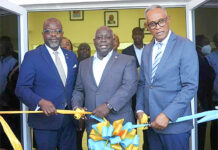
Madam Speaker:
Today, as I rise on behalf of the hard-working and magnificent Bahamians who call Cat Island, Rum Cay, and San Salvador home, I do so with great enthusiasm, as we begin debate on the Electricity Bill, 2024 and the Natural Gas Bill, 2024.
These two bills provide the legislative framework that will support our nation’s energy reforms – reforms that will light the way forward to a brighter future.
Our objectives are clear. We want to lower light bills for Bahamian families and businesses. We want to ensure that the electricity supply is more reliable, so that power outages are a thing of the past. And we want to drive our country’s transition to cleaner energy.
The bills before us today are essential to supporting progress on all of these fronts.
Madam Speaker:
When we asked the Bahamian people for their support so that we could form a government, a little more than two and a half years ago, we shared our Blueprint for Change, which detailed our proposals for change and reform across a range of important issues.
In this Blueprint, we recognized the necessity of making electricity more affordable, more reliable, and cleaner — and we pledged to use both solar and LNG to meet these goals.
From the earliest days of our administration, we have been working hard to put this vision in motion.
Thus, today I am able to say with confidence – and with a great deal of pride in the hard work and tenacity of my colleagues – that we will soon deliver our country’s first comprehensive energy reforms, and that these reforms will deliver savings for the Bahamian people.
For too long, the cost of electricity has afflicted Bahamian families and businesses. For many, their light bill at the end of the month comes close to – or even tops – their rent or mortgage payment. It’s a major expense, and a major burden. Small businesses which might otherwise have succeeded have closed their doors because of the impact that the cost of electricity had on their bottom line.
In addition, the global inflation crisis hit small island nations like ours especially hard. Despite the fact that my government has raised the minimum wage, lowered VAT, and lowered customs duties, the rising tide of inflation has dampened the impact of these empowerment policies and robbed our people of the gains they are due. However, we aren’t close to finished – we are building affordable housing, and investing significantly in our agricultural sector, and there are more important reforms and policies to come.
We have always known that to see enduring relief from the high cost of living in The Bahamas, we would need to bring down the cost of electricity.
I emphasized earlier that the reforms we are planning will be comprehensive — because we share with the Bahamian people a conviction that our electricity sector requires transformation, and that we need to put the days of tinkering at the margins – the days of band-aids and temporary fixes – behind us.
We need system-wide change, because in order to reduce the cost of electricity for consumers, we need a grid that is well-designed, effective and efficient.
Frankly, our grid is at the end of its life. We simply cannot lower costs – or meet our full potential as a nation – with outdated, deteriorating energy infrastructure.
Madam Speaker:
We have seen our economy roar back to life, after the dark days of pandemic curfews and lockdowns.
We are breaking all kinds of records, and we intend to keep breaking them – we will always work relentlessly to create opportunities, and to make sure these opportunities reach more and more of our people.
But an aging 20th century grid can’t support a dynamic 21st century economy.
Not in a digital era, when so many of us rely on computers and smartphones for working and studying, and not in a climate change era, when warmer temperatures mean the air conditioning gets turned on more often.
Not when smart and serious investors require reliable, sustainable power.
We are working to make government buildings more energy-efficient, and to encourage responsible electricity consumption and the use of energy-efficient appliances in the public and private sector.
But the reality is, the demands on our power generation and delivery systems are only going to go up, not down.
And not only is our grid deteriorating – making it prone to outages, and vulnerable during strong storms – it also lacks the capacity to integrate large-scale renewable energy.
Not long ago, one of our Caribbean neighbours had to stop a large-scale, multi-million dollar solar expansion upon realizing that its outdated power grid could not absorb solar generation. This is no mere hiccup; setbacks of this nature cost the people time and money. We will not make the same mistake.
Solar energy has always been essential to our plans – but solar power is intermittent. That means the amount of solar power generated will fluctuate – will vary – depending on whether it’s a sunny day or a cloudy day, daytime or nighttime. Using solar energy across our archipelago requires careful planning and design, and major new investments in grid flexibility and energy storage.
Madam Speaker:
The BPL we inherited from our predecessors was in serious crisis.
$500 million in debt. Half a billion dollars. With experts telling us we need another $500 million in capital investments, to rescue and then modernize a grid on the verge of collapse.
That’s more than one billion dollars, just to get BPL on track.
And that’s before we get to the additional $100 million-plus in pension liabilities. And let me say this clearly: we will meet every commitment to our workers. No one will lose their job, and pension and other commitments will be met.
So, Madam Speaker, while we are clear about how crucial it is to lower bills for Bahamians struggling with the too-high cost of living, clear about the necessity and urgency of upgrading our grid, and clear about our commitment to Bahamian workers, we aren’t going to say that it’s been simple or effortless, finding the right way forward – especially during a time when many other countries are making their own transitions to solar and LNG, and the availability of critical materials can lead to long wait times.
But we have big ambitions for The Bahamas and for the Bahamian people. And we don’t believe in standing still. We came here to tackle the most difficult and most consequential problems – the ones that hold our country and our people back.
As you have heard me say: we didn’t come here to defend a broken status quo, we came here to change it.
To create a 21st century economy, we need a 21st century power grid – a modern grid that is more efficient and cost-effective, capable of transmitting clean energy, and more resilient and capable of withstanding hurricanes.
In other words: a new energy future for our country: extensive use of solar power, in New Providence and in the Family Islands, LNG as a partner fuel, and a modern power grid.
We have already begun laying the foundation for this paradigm shift in our Family Islands. In December of last year, we put out a Request For Proposals for Solar and LNG generation in the islands and saw a strong response from both international and local providers. We are now in the final stages of selection, and I look forward to being able to announce the providers in the coming weeks.
As we move forward, we need the right laws in place to support our progress.
With the Electricity Bill (2024), we are repealing and replacing the Electricity Act and repealing the Electricity Rate Reduction Bond Act, which promised funding that never materialised.
Our Bill ensures that URCA will have regulatory oversight over renewable energy, and promotes the adoption of efficient energy practices.
URCA will also act as an arbitrator should any disputes arise between licensees and a third party.
This Bill allows system operators to enter into management agreements with licensees to manage specific functions, and allows URCA to take restorative natural disaster relief costs into account when tariff rates are being determined.
The Bill introduces a transition period of three years in which URCA will accept the existing tariff rates presently in effect for licensees. During the next three years, a tariff review will be conducted with the objective of making the rates more equitable. It is our intention for tariff rates to residential consumers to go down, not up.
This forward-looking Bill is also the first legislation in our nation’s history to regulate artificial intelligence and machine learning. In clause 18, the Bill requires any person or entity developing or deploying AI and ML to demonstrate transparency and comply with all applicable laws, including those which cover data protection, cybersecurity, privacy and intellectual property.
There is also the requirement that the use of AI be inclusive by design, considering the needs of the elderly, disabled, and other vulnerable groups.
This is comprehensive legislation, characterised by the effort to modernise the legal framework so that we can deliver change for the Bahamian people, while ensuring that URCA has robust regulatory powers.
The legislation provides URCA with the legal authority to navigate a complex, evolving energy landscape, with the flexibility to take advantage of innovations and opportunities in the sector.
This Bill also specifies that the Grand Bahama Power Company is an approving authority for the island of Grand Bahama – that simply means it is authorised to generate and sell electricity in that jurisdiction.
Now, I know the member for Marco City had some commentary on the matter. He mentioned that the Port Authority might have a problem with the Bill because Grand Bahama Power Company will now be subject to URCA just as BPL is.
He seems to enjoy speaking up for the Port Authority. I don’t think I’m the only one who’s noticed that.
But be that as it may, if the Member from Marco City wants the people of Grand Bahama to benefit from the reforms, then he should embrace this Bill.
Who does not want to benefit from more affordable, more reliable, cleaner energy? Yes, we believe Grand Bahama should be included.
This Bill also recognises URCA as the regulatory authority for Grand Bahama. And this is nothing new. This government has always maintained that the Electricity Act and URCA’s regulatory authority extends to the Grand Bahama Power Company, so this is nothing new. This view will now be reflected in the law.
Madam Speaker:
The second bill before us today, the Natural Gas Bill, regulates liquified natural gas, or LNG, for power generation purposes. This Bill creates a framework for LNG that ensures that all LNG-related operations are carried out in a safe, efficient, effective, economically viable and environmentally sound manner.
I know the Bahamian people have heard about the potential of LNG for quite a number of years. The Bill before us today finally paves the way for LNG to be effectively integrated into our fuel mix.
Through this Bill, we have assurances to the Bahamian people that the transport and storage of LNG will be done in accordance with the highest health and safety standards. This Bill also promotes competition within the sector by prohibiting anti-competitive agreements and practices.
Once again, we are ensuring that the people of Grand Bahama are not left out, as the legislation specifies that this Bill applies to the entirety of The Bahamas “inclusive of the Port Area in the island of Grand Bahama. For the avoidance of doubt, this Act applies to any gas sector supplier in the Port Area.”
Of course, URCA also retains its country-wide regulatory authority for matters pertaining to LNG as well. In fact, URCA will be empowered to expedite approval for licenses as long as the company has been operating internationally for more than five years in an URCA-approved jurisdiction. Such companies must apply for a license within 12 months of the commencement of the Act.
The goal here is efficiency and flexibility so that LNG can be brought into our fuel mix as soon as possible.
Madam Speaker:
As I said earlier, our commitment to BPL workers is ironclad.
We will continue to honour existing union agreements.
We will accomplish our objectives without layoffs.
We are a government that takes our commitment to workers seriously.
Remember, we signed more than 25 new labour agreements in two and a half years — after our predecessors failed to sign one in nearly double that time.
We continue to have regular meetings with unions and take a proactive approach to dispute resolution, to ensure that Bahamian workers are respected and protected. We have always prioritised our partnerships and relationships with local unions, and BPL’s union is no exception.
Madam Speaker:
These bills are an important and necessary step forward.
They represent progress that’s been a long time coming.
LNG was supposed to be the next big thing under the Minnis administration, but their negotiations fizzled, their promises to make it “the people’s time” forgotten, leaving the country with only a battered, debt-ridden BPL.
Killarney and Marco City, they may try to out do each other in bashing us — and we can only guess as to why they might put on an especially vigorous performance this week.
But Bahamians are smart enough to have a healthy skepticism about the skills and intentions of those responsible for the OBAN fiasco, or those who tend to reflexively defend the Grand Bahama Port Authority.
And we can’t forget the failure of the Wartsila engines, which were placed in an aged facility that can only accommodate five of the seven generators at a time, which means that they will never live up to their cost-savings potential. This affected the mix of fuel that was used for projections on their hedge, which meant that the hedge they like to bring up all the time was underperforming as well. The Wartsila engines were promoted as tri-fuel – they said they would be compatible with LNG but they’re not – that mistake will cause us $30 to $60 million in conversion costs.
And then there was the Rate Reduction Bond Act, which was supposed to generate over $500 million to address BPL’s debt situation. Instead, those legacy debts were passed on to us.
Madam Speaker:
In a better world, the previous government would have already laid a strong foundation for energy reform – they would have recognized the urgency of modernizing our grid, to gain efficiencies and lower prices. In a better world, the previous administration would have upgraded the grid’s capacity to carry cleaner energy. They would have moved this sector forward, understanding that the electricity demands of our economy and country would only grow. That didn’t happen, Madam Speaker, as you’re well aware.
So perhaps you will forgive us if we cannot take them very seriously now.
We’ve moved on from their failures. We’ve spent our time working, not complaining.
Real energy reform requires embracing innovation, new opportunities, and more effective business models to get BPL back to a healthier financial standing, and to finally lower costs for consumers.
We are ushering in a new era of power generation. And I can say with confidence to the Bahamian people that we will deliver on those three strategic objectives of more affordable, more reliable, and cleaner electricity.
This is a monumental undertaking – the most ambitious energy reform agenda ever initiated in our history.
Madam Speaker:
The Electricity Bill, 2024 and the Natural Gas Bill, 2024 have my unreserved support, as important stepping stones on the path to our country’s brighter energy future.







